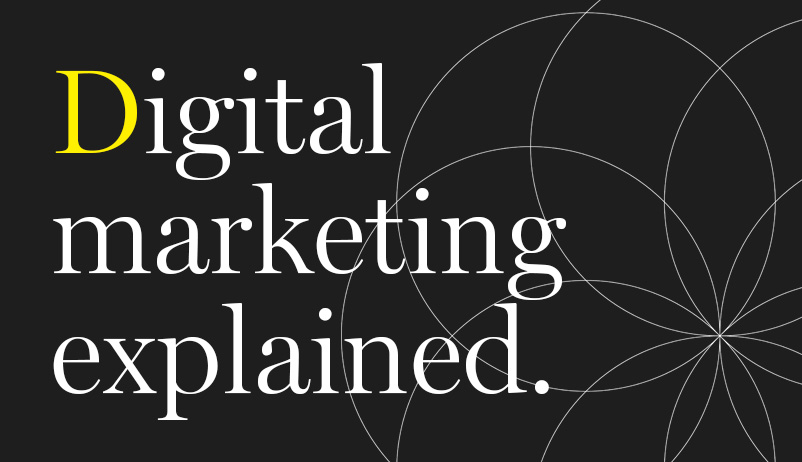

Digital Marketing
Digital Marketing
What is Digital Marketing?
Lorem ipsum dolor sit amet, consectetur adipiscing elit. Suspendisse varius enim in eros elementum tristique. Duis cursus, mi quis viverra ornare, eros dolor interdum nulla, ut commodo diam libero vitae erat. Aenean faucibus nibh et justo cursus id rutrum lorem imperdiet. Nunc ut sem vitae risus tristique posuere.
What Does Digital Marketing Mean?
Digital marketing refers to the use of digital strategies, channels and technologies to promote products, services, or brands to a target audience. It encompasses various online marketing techniques that leverage digital platforms, such as websites, search engines, social media, email, mobile apps, and other digital channels, to connect with customers and drive desired outcomes, such as brand awareness, customer engagement, lead generation, and sales.
What’s Included In a Digital Marketing Strategy?
The first element of digital marketing is to formulate a strategy. A digital marketing strategy is a comprehensive plan that outlines the goals, objectives, tactics, and channels to be used in digital marketing efforts to achieve the desired outcomes for a business. Here are some common components that may be included in a digital marketing strategy:
- Goals and Objectives: Clearly defining the goals and objectives of the digital marketing efforts, such as increasing brand awareness, driving website traffic, generating leads, boosting sales, improving customer engagement, or expanding into new markets.
- Target Audience: Identifying the target audience or ideal customer segments for the digital marketing efforts, including their demographics, preferences, needs, and behaviours.
- Market Research: Conducting market research to understand the competitive landscape, customer preferences, industry trends, and other relevant insights that can inform the digital marketing strategy.
- Channel Selection: Identifying the most relevant digital marketing channels to reach and engage with the target audience, based on the goals, target audience, and available resources. This can include search engines, social media, email, content marketing, paid advertising, mobile marketing, and others, as discussed in the previous answer.
- Content Strategy: Developing a content strategy that includes the creation, distribution, and optimisation of relevant and valuable content to attract, engage, and retain the target audience. This can include blog posts, articles, videos, infographics, whitepapers, and other types of content.
- SEO and PPC Strategy: Formulating a search engine optimisation (SEO) and pay-per-click (PPC) strategy to improve organic search rankings, increase visibility, and drive targeted traffic to the website or landing pages.
- Social Media Strategy: Creating a social media strategy that outlines the goals, content plan, posting schedule, engagement strategy, and advertising tactics for social media platforms to build brand awareness, engage with customers, and drive website traffic.
- Email Marketing Strategy: Developing an email marketing strategy that includes building and nurturing an email list, creating targeted email campaigns, and automating email workflows to drive customer engagement, loyalty, and conversions.
- Paid Advertising Strategy: Creating a paid advertising strategy that includes setting budgets, selecting the right platforms, defining target audiences, creating ad creatives, and monitoring and optimising ad campaigns for maximum ROI.
- Mobile Marketing Strategy: Formulating a mobile marketing strategy that includes optimizing websites and mobile apps for mobile devices, creating mobile ads, and leveraging mobile technologies to engage with mobile users.
- Measurement and Analytics: Establishing measurement metrics and analytics tools to track and analyse the performance of digital marketing efforts, and using the insights to optimise strategies and tactics for better results.
- Budget and Resource Allocation: Defining the budget and resource allocation for digital marketing efforts, including personnel, tools, technologies, and other resources required to execute the strategy effectively.
- Timeline and Implementation Plan: Creating a timeline and implementation plan that outlines the sequence of activities, milestones, and deadlines for executing the digital marketing strategy.
These are some common components that may be included in a digital marketing strategy. The specific components and their emphasis may vary depending on the business's goals, target audience, industry, and available resources. A well-defined and executed digital marketing strategy can help businesses achieve their marketing objectives and drive growth in the digital landscape.

"Digital marketing encompasses various online techniques to connect with customers, drive outcomes, and achieve marketing objectives. It offers advantages like increased reach, cost-effectiveness, and measurable results, but faces challenges such as high competition and a constantly changing landscape."
Paul Mills
Founder, VCMO
What Are Examples of Digital Marketing Activities?
Formulating a digital marketing strategy also maps out what digital activities are needed to engage, nurture and monitor the behaviour of target audiences. The activities digital marketers typically deploy include (but are not limited to) the following:
- Search Engine Optimisation (SEO): Optimising websites and online content to improve their visibility on search engine results pages (SERPs) and drive organic (non-paid) traffic. Channels like Google, Bing, and other search engines are used for search engine optimisation (SEO) and pay-per-click (PPC) advertising.
- Pay-Per-Click (PPC) advertising: Running online advertising campaigns where advertisers pay for each click on their ads, such as Google Ads, Bing Ads, and social media advertising.
- Social Media Marketing: Promoting brands, products, or services on social media platforms, such as Facebook, Instagram, Twitter, LinkedIn, and YouTube, to engage with customers, build brand awareness, and drive website traffic.
- Content Marketing: Creating and distributing valuable and relevant content, such as blog posts, articles, videos, infographics, and whitepapers, to attract, engage, and retain customers.
- Email Marketing: Sending targeted and personalised emails to a list of subscribers to promote products, nurture leads, and build customer relationships.
- Influencer Marketing: Collaborating with influencers or popular personalities in a niche to promote products or services to their audience.
- Website Development and Design: Creating and optimising websites to provide a seamless user experience, drive traffic, and convert visitors into customers.
- Analytics and Reporting: Using data and analytics to measure, analyse, and optimise marketing efforts, and report on key performance indicators (KPIs) to improve marketing effectiveness.
- Mobile Marketing: Optimising marketing strategies for mobile devices, such as smartphones and tablets, through mobile apps, mobile advertising, and mobile-optimized websites.
- Online Reputation Management (ORM): Monitoring and managing the online reputation of a brand or business by responding to customer reviews, managing social media mentions, and addressing negative feedback.
These are just some of the many activities and channels used in digital marketing, and the choice of channels depends on the specific goals, target audience, and marketing objectives of a business. An effective digital marketing strategy typically involves a combination of different channels to reach and engage with the target audience in a cohesive and integrated manner.
What Are the Advantages of Digital Marketing?
Digital marketing offers numerous advantages for businesses, including:
- Increased Reach: Digital marketing allows businesses to reach a wider audience, both locally and globally, as it is not limited by geographical boundaries. This enables businesses to tap into new markets and expand their customer base.
- Cost-Effective: Digital marketing can be more cost-effective compared to traditional marketing methods. It offers options for businesses to set budgets, target specific audiences, and optimize campaigns for better return on investment (ROI).
- Greater Targeting Capabilities: Digital marketing allows for precise targeting of specific audience segments based on various demographics, interests, behaviors, and other parameters. This helps businesses reach their ideal customers with personalised messaging, resulting in higher engagement and conversion rates.
- Measurable Results: Digital marketing provides robust analytics and reporting tools that allow businesses to track and measure the performance of their campaigns in real-time. This data-driven approach helps businesses make informed decisions, optimize their strategies, and achieve better results.
- Enhanced Customer Engagement: Digital marketing offers multiple channels for businesses to engage with their customers, such as social media, email, content marketing, and interactive websites. This allows for two-way communication, building customer relationships, and creating loyal brand advocates.
- Flexibility and Agility: Digital marketing provides businesses with the flexibility to quickly adapt and modify their strategies based on changing market dynamics and consumer preferences. This agility allows businesses to stay relevant and competitive in a fast-paced digital landscape.
- Brand Building and Awareness: Digital marketing offers opportunities for businesses to create and promote their brand image through various channels, such as social media, content marketing, and online advertising. This helps businesses establish their brand identity, increase brand awareness, and differentiate themselves from competitors.
- Higher Conversion Rates: Digital marketing provides businesses with targeted and personalised messaging to their audience, resulting in higher conversion rates compared to traditional marketing methods. This can lead to increased sales, revenue, and business growth.
- Enhanced Customer Data and Insights: Digital marketing generates a vast amount of customer data and insights that businesses can leverage to understand customer preferences, behaviours, and trends. This helps businesses make data-driven decisions and create more effective marketing strategies.
- Improved Customer Experience: Digital marketing allows businesses to create seamless and personalised customer experiences through various touchpoints, such as websites, social media, and email. This results in improved customer satisfaction and loyalty.
These are some of the advantages of digital marketing that can benefit businesses in today's digital age. By leveraging the power of digital channels, businesses can reach their target audience more effectively, drive better results, and achieve their marketing and business objectives.
What Are the Disadvantages of Digital Marketing?
While digital marketing offers many advantages, there are also some potential disadvantages that businesses should be aware of:
- High Competition: Digital marketing is highly competitive, and businesses need to put in significant effort to stand out among the vast number of online competitors. This can require substantial investment in resources, time, talent and budget to stay ahead in the competitive digital landscape.
- Constantly Changing Landscape: The digital marketing landscape is ever-evolving, with frequent changes in technology, platforms, algorithms, and consumer behaviour. This can make it challenging for businesses to keep up with the latest trends and best practices, requiring continuous learning and adaptation.
- Information Overload: The abundance of digital marketing channels and tactics can lead to information overload, making it challenging for businesses to navigate and prioritise their marketing efforts effectively. It requires careful planning and strategic decision-making to allocate resources and efforts wisely.
- Digital Security Risks: Digital marketing involves the collection, storage, and use of customer data, which can pose security risks, such as data breaches, cyber attacks, and privacy concerns. Businesses need to invest in robust security measures and comply with data protection regulations to safeguard customer information.
- Ad Blocking and Ad Fatigue: Consumers can use ad blockers, skip ads, or simply ignore digital ads, leading to ad fatigue and reduced effectiveness of digital advertising efforts. This requires businesses to create engaging and relevant content that resonates with their target audience to overcome these challenges.
- Negative Online Reputation: Digital marketing opens up the possibility of negative feedback, reviews, and comments from customers or competitors, which can impact a business's online reputation. Managing online reputation and addressing negative feedback requires proactive monitoring and timely response.
- Dependence on Technology: Digital marketing relies heavily on technology, including various tools, platforms, and data analytics. Technical issues, downtime, or disruptions can impact the effectiveness of digital marketing efforts and require prompt resolution.
- Skill and Knowledge Requirements: Digital marketing requires specific skills and expertise in areas such as SEO, keyword analysis, social media management, content creation, and data analytics. Businesses need to invest in recruiting and retaining skilled digital marketing professionals or outsourcing to agencies to ensure effective execution of their digital marketing strategies.
- Compliance and Legal Challenges: Digital marketing is subject to various laws and regulations, including data protection, privacy, and advertising standards. Businesses need to ensure compliance with these regulations to avoid legal issues and reputational damage.
Despite these potential disadvantages, the benefits of digital marketing often outweigh the challenges, and businesses can mitigate risks through careful planning, strategic execution, and continuous monitoring and adaptation. Digital marketing, when done right, can yield significant advantages in reaching and engaging with customers in the online world.
Recap of Digital Marketing.
In conclusion, digital marketing is a vital component of a successful marketing strategy in today's world. It enables businesses to reach a wider audience, engage with potential customers, and drive more traffic to their website or physical location.
By leveraging the right digital marketing channels and strategies, businesses can improve their online presence and increase their revenue. However, it's vitally important to understand the pros and cons of digital marketing and be mindful of data privacy regulations to make informed decisions and maximise your marketing efforts.
About VCMO
VCMO is a UK-based provider of fractional marketing services, supporting B2B SMEs—ranging from funded scale-ups to mid-tier and private equity-backed businesses—through key moments of growth and transformation. Its Chartered Fractional CMOs and SOSTAC® certified planners embed strategic marketing leadership into organisations navigating product launches, new market entry, acquisitions, and leadership gaps.
Ready to take your marketing to the next level? Let us help you get there.
Subscribe to Our Newsletter
Fractional Edge is our montly newsletter sharing expert opinion on the latest trends in fractional leadership, curated marketing content from leading sources, VCMO events, and much more. Subscribing is quick — just add your name and email.










